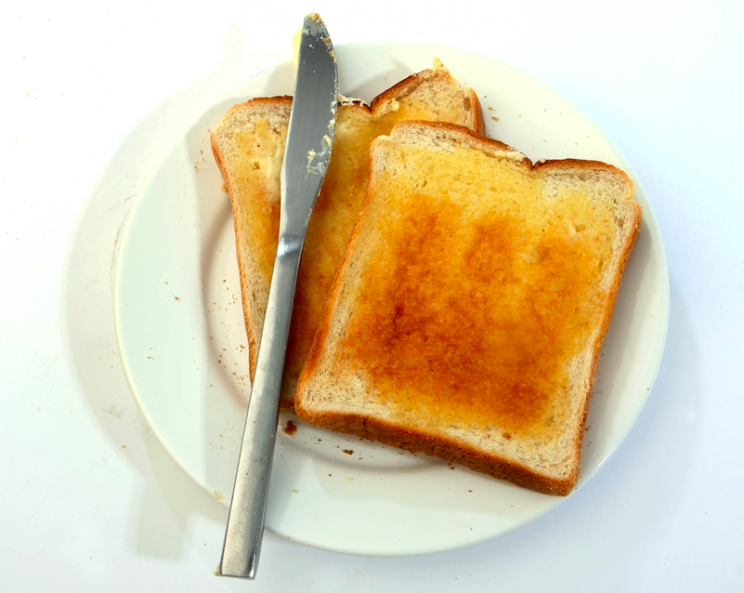Burnt toast and crispy roast potatoes ‘linked to cancer’: FSA warns against overcooking starchy foods

A government body has confused food fans across Britain after warning that overcooking starchy foods like bread and potatoes could increase your chances of developing cancer.
Burnt toast and over-cooked roast potatoes are included in the list of everyday products that are potentially dangerous, according to the Food Standards Agency (FSA).
They have now issued a public warning over the risks of acrylamide – a chemical compound that forms in some foods when they are cooked at high temperatures (above 120C).
Studies in mice have shown that high levels of acrylamide can cause neurological damage and cancer.
However, the warning to not overcook certain foods was not immediately backed up by Cancer Research UK, who said said the link between acrylamide and certain foods is not clear and consistent in humans.

Emma Shields, health information officer from Cancer Research UK, said: “To be on the safe side, people can reduce their exposure by following a normal healthy, balanced diet – which includes eating fewer high calorie foods like crisps, chips and biscuits, which are the major sources of acrylamide.”
The FSA campaign advises people that they can reduce their risks of developing cancer, including opting for a gold colour – rather than darker brown – when frying, roasting, baking, grilling or toasting.
Professor Guy Poppy from the FSA and University of Southampton told Yahoo News UK that Cancer Research also said it was good to reduce acrylamide from our diets.
He said: “Our advice is not just from the FSA but also reflects worldwide guidelines…
“Animal studies can show how high levels of acrylamide can cause cancer and the same reaction happens in humans, so it is reasonable to highlight that there are similarities.”
He added: “We are not saying we should cut out all these foods or ban them entirely. We simply want to give reasonable advice.”

MORE: Speed limit on the M1 could be cut to 60mph to tackle pollution
MORE: Lee Rigby killer hires lawyer in £20,000 compensation bid
As a “rule of thumb”, people should aim for a golden yellow colour or lighter when frying, roasting, baking or toasting starchy foods, according to the FSA campaign.
For example, roast potatoes should not be “fluffed up” to maximise dark brown crispy bits and they should be roasted to the lightest colour that is acceptable. Toast should also be browned to a light brown colour.
People are being told to follow the cooking instructions on packaging to ensure foods are not cooked for too long or at too-high temperatures.
Unsurprisingly, not everyone is happy with being told that their favourite food might be dangerous:
Leave roast potatoes and toast out of this
— VeryBritishProblems (@SoVeryBritish) January 23, 2017
Today I am mostly going to be eating nicely browned toast, chips and crispy roast potatoes.
— Julia Hartley-Brewer (@JuliaHB1) January 23, 2017
Roast potatoes. Chips. Toast. The latest to ‘blame’ in causing cancer. Really, world, really???
— Lou ❁ (@lulaloops88) January 23, 2017
LEAVE MY CRISPY POTATOES AND BURNT TOAST ALONE YOU MONSTERS.
— Britt Whyatt ???????? (@shewhobakes1) January 23, 2017
Acrylamide is found in high levels in a range of foods including breakfast cereals (not porridge), chips, potato products (such as waffles or children’s potato shapes), biscuits, crackers, crispbread and crisps.
The chemical is also found in coffee, cooked pizza bases, black olives and cereal-based baby foods.
Root vegetables including potatoes, sweet potatoes, beetroot, turnip, swede and parsnips can all carry high levels of the compound once they have been roasted or fried until darker brown or crispy – making the traditional Sunday roast a minefield.

As well as high temperatures, long cooking times can increase levels of acrylamide even further.
Foods such as skinny fries and crisps appear to have the highest levels.
Acrylamide forms due to a chemical reaction between certain sugars and an amino acid (asparagine) in the food.
However, boiling, steaming and microwaving appear far less likely to cause the reaction.
The FSA said people should not keep potatoes in the fridge, which can increase overall levels of acrylamide. Instead, raw potatoes should be stored in a dark, cool place with temperatures above 6C.
Gavin Shears, a senior policy adviser in contaminants at the FSA, said: “We are not expecting people to go out and radically change their diets if they’re eating a healthy balanced diet.
“If you slightly overdo your roast potatoes on a Sunday, it’s not that you have to throw them away. We’re not asking people to cut out certain foods.
“This is about reducing your overall lifetime risk through simple steps.”
A spokesperson added to Yahoo News UK: “There is no need to worry about the occasional piece of food or meal that is a little overcooked because our advice is designed to help you take action to manage acrylamide levels in the foods you eat regularly, over your lifetime.
“Our advice is designed to complement the action the food industry is making to reduce acrylamide in food you buy.
Top pic: Rex

 Yahoo News
Yahoo News 


